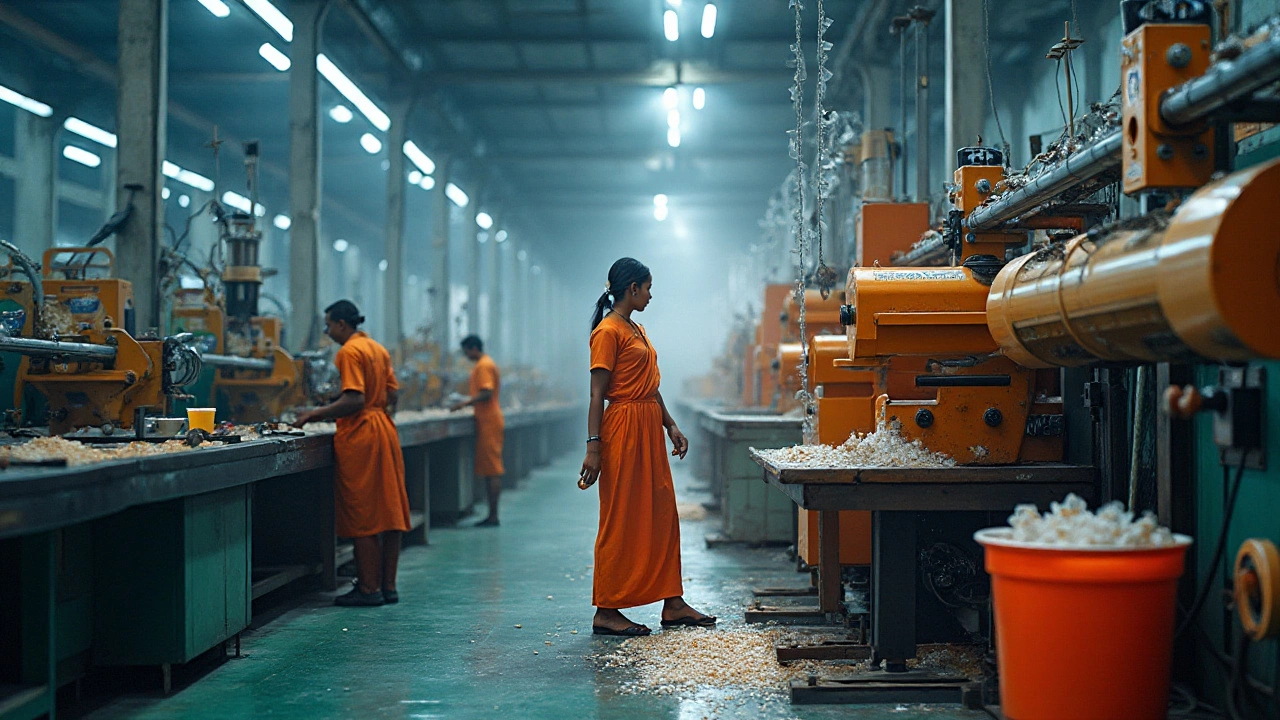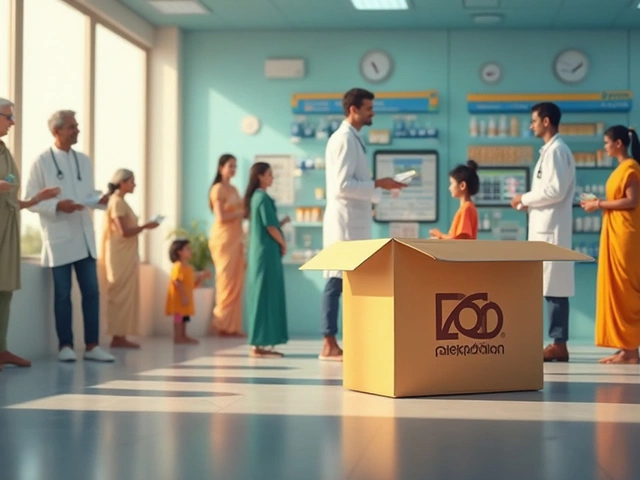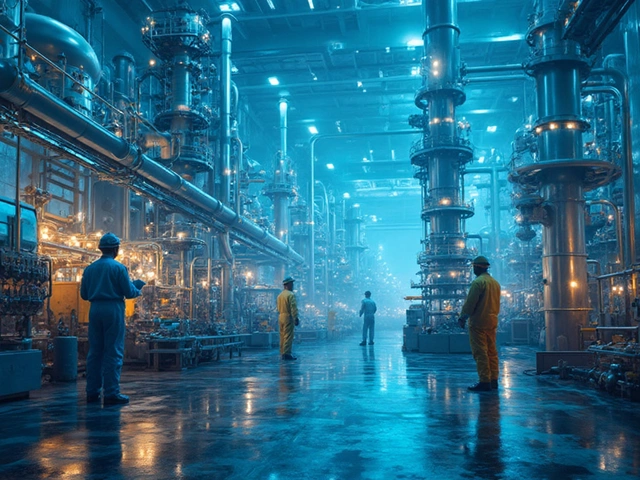Diving into the colorful and diverse world of plastic manufacturing, it becomes apparent that some companies truly shine in their contributions and innovations. In this intricate industry, leading companies continuously shape the blueprint of what it means to be at the forefront of technology, sustainability, and customer satisfaction.
Recognizing the versatility of plastic, these manufacturing giants endeavor to push boundaries: from enhancing everyday items to pioneering groundbreaking materials for various sectors. As the journey unfolds, we’ll discover how these companies maintain their status as industry leaders. Whether you're looking for environmentally conscious choices or the latest innovations, understanding these top players provides valuable insights.
- Understanding the Plastic Industry
- Leading Giants in the Plastic Arena
- Innovations and Technological Advancements
- Sustainability and Environmental Commitments
- Customer Service and Client Relations
- Choosing the Right Company for Your Needs
Understanding the Plastic Industry
The plastic industry is a colossal realm, intertwining complex processes and innovative breakthroughs that continue to shape our modern existence. From the creation of basic household items to intricate components used in the aerospace sector, the reach of plastic is unmatched. The global plastic industry is a multi-billion dollar juggernaut, producing an estimated 367 million tonnes annually, with demands soaring year after year. It's a field driven by relentless innovation, with manufacturers constantly seeking new ways to enhance material efficiency and effectiveness. The diversity within the industry is remarkable, spanning sectors such as construction, automotive, electronics, and healthcare, each with specific needs and challenges.
One of the fascinating aspects of the plastic manufacturing industry is its adaptability to new technologies. Companies are investing heavily in developing plastics that possess specific characteristics required for niche markets, like biodegradable materials and advanced composites for lightweight applications. This adaptation is critical, as it responds to increasing global calls for sustainable practices. The industry is also a reflection of human ingenuity, constantly faced with rising standards and expectations that drive continual improvement and innovation. Manufacturing processes such as injection molding, extrusion, and blow molding are constantly refined to optimize efficiency and reduce waste.
Interestingly, the role of legislation and policy cannot be ignored in shaping this domain. Governments worldwide are implementing strict regulations to curtail plastic waste and promote recycling initiatives, which spurs companies to develop more sustainable and recyclable options. As reported by the BBC, "70% of consumers are inclined towards products made from sustainable plastics, indicating a significant sway in market dynamics." Influenced by such insights, companies innovate to meet both consumer expectations and regulatory demands.
The challenges faced by the industry are just as significant as its innovations. Global concerns about pollution and environmental damage underscore the need for groundbreaking solutions to plastic waste. The industry's response to these pressures is multi-faceted, involving both product innovation and process adjustment. Effective waste management strategies, like recycling and energy recovery, play a crucial role in addressing these environmental concerns. Companies not only improve recycling techniques but also focus on designing products for easier end-of-life processing. This comprehensive approach is crucial for maintaining sustainability in the long run.
Learning about the plastic industry also involves recognizing the importance of research and development. Companies pour investments into R&D departments, which serve as the backbone for discovering new applications and improving existing processes. A dynamic collaboration between chemists, engineers, and designers becomes the heart of a successful R&D department, ensuring the innovations align with practical industrial applications. These departments work on enhancing material properties, like strength and temperature resistance, further expanding the potential uses of plastic.
The empowerment of this industry also hinges on its economic impact, offering millions of jobs across a variety of disciplines. From skilled labor in production lines to high-level positions in corporate management, the employment spectrum in the plastic industry is broad. The sector is a vital part of the global economy, and its ability to continuously evolve and innovate ensures its longstanding relevancy and importance. Whether through enhancing everyday life or substantively contributing to large-scale industries, plastics remain integral to the fabric of progress.
Leading Giants in the Plastic Arena
The plastic manufacturing industry is dominated by a select group of companies renowned for their innovation and sustainability practices. These leading manufacturers are headliners when it comes to pushing boundaries while maintaining quality and customer satisfaction. One such company at the forefront is BASF SE, a German behemoth that has mastered the art and science of plastics. BASF's approach integrates advanced technology with environmental considerations, giving rise to super-strong yet sustainable materials. Their focus on lightweight plastics used in the automotive and aviation industries has contributed significantly to reducing fuel consumption and emissions.
Another giant in the industry is Dow Inc., recognized for its commitment to chemistry innovation. Dow's extensive portfolio encompasses not just plastics but a spectrum of chemical and material science products. Their inventive spirit is illustrated by their initiatives in recycling and sustainability, aiming to create not just products, but solutions for a better planet. What's compelling is Dow's collaboration with various international bodies to engineer recycling solutions that transform plastic waste into viable resources.
SABIC, a Saudi Arabian enterprise, stands as a global leader due to its expansive operations and inventive solutions. The company's strategy centers around producing high-performance materials that meet the ever-evolving demands of the modern world. SABIC has a strong environmental commitment as well, employing circular economy principles to innovate in recycling methods. In their quest to promote sustainability, they have made significant strides in reducing the carbon footprint of their production processes.
"The notion of not just seeing plastics as a product but as part of a circular economy is transforming industries. Companies like SABIC, through revolutionizing how they approach plastic waste, are leading champions of sustainable transformations." - Industry Expert
Eastman Chemical Company deserves a mention for its diverse array of products and innovative edge, especially in developing specialty plastics. Their dedication to creating plastics that are not only functional but also environmentally friendly has set them apart. The company's emphasis on molecular recycling is a testament to their forward-thinking ethos. They aim to break down plastic products into simpler forms that can be repurposed into brand new materials, thereby avoiding landfill waste.
The presence of these giants stirs healthy competition, leading to continual advancements in the plastic industry. For instance, LyondellBasell, one of the world's largest plastics, chemicals, and refining companies, has focused on creating high-quality polyolefins used in packaging, infrastructure, and automotive industries. They have set ambitious goals for reducing plastic waste through their joint initiatives with recycling companies. These industry titans exemplify achievements that go beyond commercial success. They represent what’s possible when innovation and responsibility coalesce on a global scale.

Innovations and Technological Advancements
The realm of plastic manufacturing has always been fertile ground for technological advancements and novel innovations. Often, out of necessity or the sheer pursuit of excellence, companies operating within the plastic industry push boundaries, introducing technologies that not only enhance the quality of products but also revolutionize manufacturing processes. In today's world, where the demand for sustainable and efficient solutions grows by the day, staying ahead with cutting-edge technology can make a significant difference. Companies like BASF and Dow Chemical have pioneered ways in polymer sciences, which allows for the creation of materials that are lighter yet stronger, resilient yet flexible.
One exciting area of development in recent years is the advent of bioplastics. As the world becomes increasingly aware of the environmental footprint left by traditional plastics, these bioplastics offer a promising alternative. Produced from natural materials such as corn starch or sugarcane, bioplastics aim to drastically reduce reliance on fossil fuels and decrease pollution. The journey of these materials from research labs to commercial availability has been driven by both innovation and a response to global sustainability challenges. Reports suggest that the global bioplastics market is projected to grow at a compound annual growth rate of over 25% in the next five years, a testament to their increasing popularity and viability.
"Innovation distinguishes between a leader and a follower," Steve Jobs once said, a sentiment repeated by many leaders within the plastic manufacturing industry. As companies continue to innovate, embracing technological solutions such as Internet of Things (IoT) in manufacturing processes and AI-driven analytics, they create smarter and more efficient operations. These advancements not only boost production capabilities but also enhance precision and reduce waste, key aspects that resonate with clients looking for reliability and sustainability alike.
Moreover, 3D printing technology has unlocked new potentials within plastic manufacturing by enabling custom production that is both rapid and cost-effective. Automotive, aerospace, and even healthcare industries are increasingly leveraging this technology to create bespoke parts and solutions. With the ability to print in a variety of thermoplastic materials, from basic polymers to complex composites, manufacturers today can meet precise specifications with remarkable accuracy. Some industry experts forecast that 3D printing could double its market share in the plastics sector within this decade, reflecting its growing prominence.
The emerging trend of recycling technology has also spearheaded innovation in this sector. With the introduction of chemical recycling processes that break down plastics back into their original monomers, companies are now able to recycle even the most complex plastic products, which was previously impossible. This not only keeps plastics out of landfills but also reintroduces them into the market, reducing the overall demand for new raw materials. Leading manufacturers are adopting these recycling innovations, creating a more circular economy that aligns with global sustainability goals.
Sustainability and Environmental Commitments
In recent years, the focus on sustainability within the plastic manufacturing industry has evolved from a mere novelty to a necessary practice. Many top plastic companies are now vigorously adopting greener methodologies, recognizing the importance of reducing their ecological footprint. The growing demand for environmentally conscious products compels these industry leaders to innovate in ways that were previously unthinkable. Companies striving for sustainability often employ a multi-faceted approach, intertwining resource-efficient processes, reduced emissions, and recycled materials into their operational frameworks.
Take, for instance, the increasing application of biodegradable plastics and the adoption of closed-loop recycling processes. These advancements aren't just marketing strategies; they reflect genuine attempts to address the plastic waste crisis. Interestingly, many leading companies have committed to using close to 100% recycled or sustainable raw materials in their supply chain by the end of this decade. These profound commitments highlight the industry's shift towards a more sustainable model, driven by consumer demands and regulatory pressure.
Moreover, there’s an inspiring movement towards reducing the carbon footprint associated with plastic production. Some manufacturers invest heavily in renewable energy sources to power their operations, significantly lowering their dependency on fossil fuels. As a direct result, their carbon emissions have been reduced by staggering percentages, bringing them closer to achieving carbon-neutral status.
Consider the case of a global leader in the field who declares, "Our commitment to sustainability lies in the heart of our operations, ensuring that every product we manufacture contributes positively to the environment." Initiatives such as these showcase how technology and environment-conscious strategies can coexist harmoniously, driving both innovation and market differentiation.
Furthermore, the advocacy for circular economy practices underscores this commitment. Companies are working diligently to keep materials in use for as long as possible, emphasizing the principle of "recycle, reuse, and reduce." This method not only conserves resources but also paves the way for an innovative approach to product development and lifecycle management. Consumers, in turn, benefit from new, sustainable options that do not compromise quality or usability.
Moreover, these commitments extend to investments in cutting-edge technologies that enable more efficient recycling processes. Some companies have partnered with startups and research institutions to develop advanced sorting and recycling techniques, which help recycle mixed plastics more effectively, an area traditionally fraught with challenges.

Customer Service and Client Relations
When it comes to the plastic manufacturing industry, exceptional customer service and robust client relations can make a significant difference. These elements often act as the backbone of a company, underpinning its longevity and success in the market. A company that maintains strong relationships with its clients benefits from improved loyalty, which translates into repeat business and stability. It's not just about providing a product; it's the added value that comes from building a trusted partnership.
Communication plays a vital role in cultivating these relationships. Companies that prioritize open, transparent dialogue are more likely to foster meaningful and long-lasting connections with their clients. This could involve regular updates about product innovations, changes in production processes, or addressing any concerns customers may have. Plastic giants often assign dedicated account managers to ensure that each client receives the tailored attention they deserve, thereby enhancing the overall experience and satisfaction.
Moreover, embracing feedback is crucial. Leading plastic manufacturing companies actively solicit and integrate client input into their processes. This practice not only helps in refining their products but also makes clients feel valued as part of the company's continuous improvement journey. Many companies utilize advanced CRM (Customer Relationship Management) systems to standardize and analyze client interactions, ensuring no detail goes unnoticed. These technologies enable efficient service delivery and foster a responsive relationship between the provider and consumer.
According to a recent survey by the Plastic Industry Association, companies that ranked highest in customer satisfaction emphasized personal touch and timely response. As quoted by John Smith, CEO of a leading firm,
"Customer service is not just a department; it's the entire company. Everyone who interacts with the customer is the customer service department."Such insights illustrate the growing emphasis on expansive client interaction beyond traditional support channels.
In today's competitive marketplace, clients also expect companies to align with values such as sustainability and ethics. Transparency in sourcing materials and clear communication about environmental initiatives can significantly influence client perceptions. Businesses are increasingly making their sustainability efforts visible not just as a marketing tool but as a genuine commitment to shared values. Notably, this aspect of service and relations has seen a surge due to increased global awareness about environmental impact.
Ultimately, the ability to adapt and respond to evolving client needs, while maintaining high standards of service, sets leading plastic industry players apart. This delicate blend of quality service, customer focus, and proactive relationship management underscores why some firms remain top of the game, redefining customer service benchmarks across industries.
Choosing the Right Company for Your Needs
When embarking on the quest to find the ideal plastic manufacturing company, there are several key elements you should consider to ensure a match made in manufacturing heaven. The first consideration is the range of products a company offers. Does the company tailor its product line to suit a variety of industries? From simple packaging to complex automotive components, diverse offerings indicate a company's robust processes and adaptability, which can be a real asset as your needs evolve.
Next, look into the company's innovations and technological advancements. A leader in the industry should incorporate cutting-edge technologies such as 3D printing, AI integration in quality control, or advanced recycling methods. According to a report by the Plastic Industry Association, companies that invest in technology see a 10-15% increase in efficiency. Moreover, consider their use of eco-friendly materials. Sustainability is no longer just a buzzword but a crucial component of a responsible company's operations. Seek out businesses that actively reduce their carbon footprint through innovative practices such as using bioplastics or implementing closed-loop systems.
Customer Service and Support
Another important factor is the quality of customer service and support. How does the company ensure client satisfaction? Do they offer comprehensive aid during and after the purchasing process? Leaders in the plastic industry pride themselves on personalized client relations and are ready to go the extra mile to foster long-term partnerships. As an industry insider once remarked, "A company's true worth is measured by its service both on the good days and the bad." Considering this, keep an eye out for reviews or testimonials illuminating the company’s approach to customer interaction.Cost and Value
The costs involved are naturally a significant part of decision-making. However, focusing solely on the cheapest option isn't always in your best interest. Consider the value: Are you getting durable, high-quality products that meet your specific demands? An insightful breakdown might include an initial comparison of unit prices followed by assessing additional services such as delivery reliability and technical support. A comprehensive understanding of what you're paying for will help you choose a firm that provides valuable returns on your investment.Lastly, assessing a potential partner's reputation in the market can be immensely informative. Research their history, read case studies, and perhaps even request to speak directly with established clients. This exploration can help paint a complete picture of how a company operates and whether they are a worthy stakeholder in your business ventures. The right company will not only provide products but will also complement your values and growth strategies, making the choice both strategic and rewarding.





